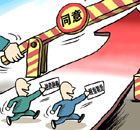Opinion
China moves to curb housing prices amid bubble fears
(Xinhua)
Updated: 2010-02-11 15:41
 |
Large Medium Small |
Chinese authorities have moved to curb soaring property prices, amid concerns that speculation and explosive growth in bank lending have caused an asset-price bubble.
In one of the latest moves, several major banks have toughened lending rules for property developers and reduced 2010 loan quotas.
Industrial and Commercial Bank of China, the nation's largest lender, said Monday it will stop lending to property developers without adequate project capital or licenses, and even reclaim loans from those who hoard land and homes.
China Construction Bank has set its 2010 new loan quota at 750 billion yuan ($109.8), down from 950 billion yuan in 2009.
Many banks have also cut mortgage rate discounts, after the People's Bank of China and the China Banking Regulatory Commission ordered steady lending growth to guard against asset bubbles and credit risks.
Punishment
The Beijing Municipal Commission of Urban Planning Tuesday said it has rejected planning changes for a land plot in the downtown area, one of the most expensive land deals last year.
Fangxing Property, a subsidiary of State-owned Sinochem, won the bid for the 155,900-square-meter plot for 4.06 billion yuan last June. It then applied to build higher buildings, and change the location of a planned park on what was then known as the "land king." The move was rejected by the commission.
Moreover, local governments have already revoked the rights of several real estate developers to buy residential land, after delays in payment and the closing of deals.
The Beijing Municipal Bureau of Land and Resources on February 1 said it has revoked the right of Beijing Dalong Weiye Real Estate Development Co to buy a land after it missed the deadline for signing a land transfer agreement.
The agency also decided to keep the 200 million yuan security deposit Beijing Dalong had paid. The company, owned by Beijing's Shunyi district government, bid and acquired the parcel of residential land in Shunyi for 5.05 billion yuan on November 20, 2009.
Dalong is not alone. Authorities in the eastern city of Nanjing said on February 3 they had revoked the rights of two property developers to buy a residential plot they won at an auction two years ago.
The developments suggest local authorities are working to regulate land sales, said Wang Yu, a lawyer at Beijing-based Dacheng Law Offices.
Timely punishment for those property developers that are quick to bid for land even though they don't hold sufficient capital may help curb home prices from souring, Wang said.
Land sales
The red-hot property market sparked huge growth in land sales last year as property developers rushed to grab land on expectations of further rises in home prices.
Yang Hongxu, an analyst from E-House China, a real estate services company, said when the economy is in a slow recovery, many companies, especially those State-owned enterprises with abundant funds, are inclined to invest in real estate for a quick profit and an inflation hedge.
China's government earned 1.59 trillion yuan from land sales last year, up 63.4 percent from a year earlier, according to the Ministry of Land and Resources.
Land sales are a major source of revenue for local governments, especially when other sources dropped off amid the global economic downturn.
The eastern city of Hangzhou netted 105.4 billion yuan in land sales taxes in 2009, the most of any city nationwide, according to the China Index Research Institute. Shanghai came next with 104.3 billion yuan while Beijing was third with 92.8 billion yuan.
Experts said local governments should speed up economic restructuring and reduce reliance on land sales for fiscal revenue, as the dependency makes local authorities reluctant to rein in soaring prices.
Zeng Yesong, a researcher at the Party School of the Central Committee of the Communist Party of China, said to curb housing prices, priority should be put on reforming the allocation of land sale earnings between the central and local governments, to reduce the latter's impulse to make fortunes with land sales.
Key to growth?
The real estate sector in China contributes about 20 percent of fixed asset investment and about 10 percent of gross domestic product, analysts say.
This has raised questions and sparked controversy: has the sector "kidnapped" China's economy, with the government unwilling to take tough measures to curb home prices out of fear it will pull down GDP growth?
Analysts said high home prices also denting private consumption, as a flat in big cities could cost the savings of up to three generations.
"As the property market is recovering rapidly this year, housing prices in some cities are rising too fast. This deserves the great attention of the central government," Premier Wen Jiabao told Xinhua on December 27.
Housing prices in China's 70 large and medium-sized cities rose 7.8 percent in December from a year earlier, the fastest pace in 18 months, official figures showed.
The picture in some big cities is especially alarming: new home prices in the southern boomtown of Shenzhen doubled to 21,660 yuan per square meter on average last October from February, when prices began to climb.
The central government is worried about home price rises in cities when increasingly numbers of middle-income families are unable to afford housing, Wang Tao, head of China Economic Research at UBS Securities, wrote in a research note.
But the government is cautious about taking measures on fears that some measures, if too harsh, could hurt the construction industry -- one of the main drivers of China's economic growth at a time external demand for Chinese exports is still weak, she said.
| ||||
The real estate market might remain weak in the first quarter of the year, as the buying spree at the end of 2009 on speculations that tax and interest rate incentives would end reduced the number of potential home buyers, the note said.
But housing prices might continue rising in the second quarter as inflation may leave the real interest rate negative, they added.













